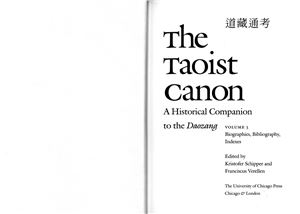Издательство: The University of Chicago Press, 2005. - 196 с.
ISBN: 9780226738178
Качество: Отсканированные страницы + слой распознанного текста Данный трёхтомник содержит описание (на английском языке) всех произведений, входящих в "Сокровищницу Дао" Дао цзан. The Daozang, or Taoist canon, is a vast collection of texts in a wide variety of genres that comprehensively define Taoism and its scriptural development through the ages. Along with revealed books, ritual texts, inspired poetry, and other religious documents, this library of the Tao contains works on subjects of broad interest to students of Chinese thought-philosophy, cosmology, medicine-as well as encyclopedic compendia literary anthologies, and collected works of individual authors. At every tu, the Daozang holds new and significant discoveries in store that are transforming our
perceptions of Chinese religion and society. The exploration of this neglected treasure house of information has been held back by its apparent impenetrability. To some extent, this is due to the esoteric or ahistorical nature of certain Taoist writings. In large part, however, generations of scholars have come to regard the Taoist canon as inaccessible as a result of the manner by which the Daozang was assembled and organized over the centuries. As Taoism evolved through history, the Taoist canon outgrew its original rationale.
ISBN: 9780226738178
Качество: Отсканированные страницы + слой распознанного текста Данный трёхтомник содержит описание (на английском языке) всех произведений, входящих в "Сокровищницу Дао" Дао цзан. The Daozang, or Taoist canon, is a vast collection of texts in a wide variety of genres that comprehensively define Taoism and its scriptural development through the ages. Along with revealed books, ritual texts, inspired poetry, and other religious documents, this library of the Tao contains works on subjects of broad interest to students of Chinese thought-philosophy, cosmology, medicine-as well as encyclopedic compendia literary anthologies, and collected works of individual authors. At every tu, the Daozang holds new and significant discoveries in store that are transforming our
perceptions of Chinese religion and society. The exploration of this neglected treasure house of information has been held back by its apparent impenetrability. To some extent, this is due to the esoteric or ahistorical nature of certain Taoist writings. In large part, however, generations of scholars have come to regard the Taoist canon as inaccessible as a result of the manner by which the Daozang was assembled and organized over the centuries. As Taoism evolved through history, the Taoist canon outgrew its original rationale.

